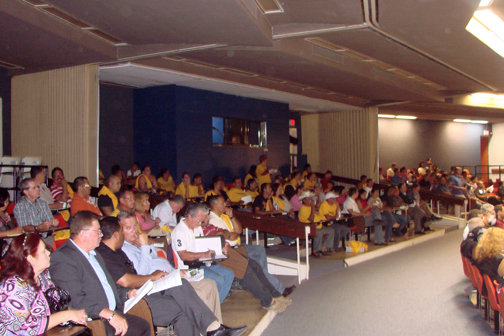Arecibo residents express mixed feelings about waste-to-energy plant project

Arecibo-area residents got their chance to express their concerns about the waste-to-energy incinerator project that New York-based Energy Answers is proposing to build in their neighborhood during an informative meeting that drew heavy participation this week.
A handful of them took the opportunity to present their opposition to the $500 million waste processing plant, pointing out the potential contamination risks to the air that could lead to deadly consequences.
“Arecibo can not take any more contamination. We have a landfill that pollutes and fails, a battery plant that also failed and pollutes our town, and now they also want to build an incinerator. Who’s to say that it will comply?” said Jessica Seigle, an Arecibo resident and head of the Zero Trash Committee that heads a grassroots recycling effort.
She was one of several neighbors who showed up at the hearing clad in black T-shirts and wearing face masks with hand-written messages on them, including “cancer,” “asthma,” and “dioxins,” referring to the potential problems that could be associated with the plant’s operation down the road.
Energy Answers’ proposed project, known as the Arecibo Puerto Rico Renewable Energy Project, will be capable of receiving up to 2,100 tons of waste per day to convert it into biofuel. At present, there are about 30 landfills on the island, most with limited lifespans left.
During the session, environmental chemist Osvaldo Rosario questioned “the math,” saying it “made no sense when they say they’re going to burn 2,100 tons of waste per day and will only generate 400 tons of ash.”
“Does that mean the remaining 1,700 tons will come out of the chimney? Matter is neither destroyed nor created. Garbage is full of material that when burned, becomes toxins. Something doesn’t add up here,” he said.
Positive feedback
Meanwhile, Energy Answers’ environmental advisors said to be pleased with the broad citizen participation during Wednesday night’s meeting hosted by the Environmental Protection Agency — which already gave the plant a preliminary go-ahead — saying the support is there.
“We’re pleased with the public meeting and the support we got from Arecibo residents who publicly expressed their support of the plant proposed by Energy Answers,” said ecologist Alexis Molinares, environmental advisor to the company.
He said the four-hour meeting “was a great opportunity to clear up doubts and questions regarding the EPA’s preliminary air permit had by the Arecibo community.”
“Last night [Wednesday] it was made clear by the EPA to the community that the technology proposed by Energy Answers is safe for the residents of Arecibo and Puerto Rico and that it will comply with stricter U.S. air standards,” said Rafael Toro, chemical engineer and environmental lawyer for Energy Answers.
Earlier this month, the EPA determined the project meets stringent air standards in place to protect human health and the environment, granting it a preliminary air permit. Toro said that approval was a “great step” toward achieving appropriate solid waste management on the island.
This week’s session is the latest in a string of more than 100 meetings Energy Answers has had with Arecibo community residents. So far, the company has obtained more than 5,000 signatures from residents who endorse the project, Energy Answers officials said.
















It is unfortunate that the government of Puerto Rico and Energy Answers are using and deceiving the people of Arecibo. The numbers and science used to justify the building of such a facility simple are incorrect. This area of Arecibo is already environmental overburden by the poorly run facilities in the area; the battery recycling facility still is polluting our health, we have a water treatment plant that is overburdened and often leaks untreated waste. The supposed jobs created by such a facility do not begin to cover the costs of build, constant clean up of waste brought in to the facility, and most importantly the health of the people. For an area that could thrive in ecotourism alone, that will NEVER be an option with a WTE here.
Key Environmental Integrity Project, report findings in the actual operations of WTE facilities include the following:
The WTE incinerators in Maryland (another EA project area) emit more pollution per hour of energy produced than each of Maryland’s four largest coal-fired power plants. These emissions include toxic pollutants such as MERCURY and LEAD that disproportionately harm children even in small doses over time.
The WTE facilities produce ash in the combustion process that can be HIGHLY TOXIC and must be carefully tested to determine its toxicity and appropriate management.
Incinerators are EXTREMELY EXPENSIVE to construct, often costing hundreds of millions of dollars to build and requiring substantial loans and tax credits.
Incineration provides fewer jobs and less economic benefits than other waste management options such as recycling and source reduction.